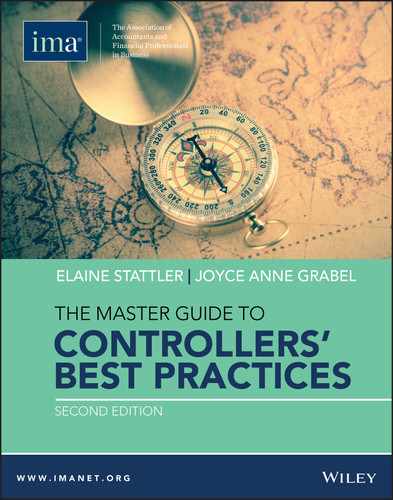SECTION 2
Business Process Best Practices
INTRODUCTION
There is more pressure than ever on controllers to go beyond the “basics” of their jobs and focus on improving processes. Today, controllers must be much more than experienced accountants.
No matter what industry a controller is in, or the size of the organization, the fundamental requirements and expectations are the same—to lead the finance department in delivering an accurate, complete set of financial statements and other data and reports while contributing to the increased financial performance of the organization.
This means having leadership skills, drive, and the willingness and ability to make changes to major processes. Controllers can become good process improvers by listening to employees and managers and learning what the real issues and obstacles are. Controllers must also invest time and effort in learning and understanding what the organization’s existing technology capabilities are, as many of the needed changes will depend on making maximum use of, and/or upgrading, this technology.
One of the controller’s highest priorities is to ensure that all accounting processes are thoroughly defined, understood, and documented. In a well-implemented, computerized accounting system or ERP solution, a well-designed chart of accounts and accurate and complete integration of all subsidiary systems and automated/IT controls will substantially increase the accuracy and completeness of the bulk of accounting transactions. The rest of the processes—some of which are manual in nature—will be easier to monitor once they have been documented and fully understood.
When errors take place, a controller must turn those errors into opportunities to implement a process improvement. This can be achieved by investigating, understanding the reason behind the error, and immediately designing and implementing a process change with a new or revised control that will mitigate the risk of such an error occurring in the future.
Organizations are relying on their controllers to move from a reactive mode of correcting recurring errors to a proactive mode of eliminating errors through strategic process improvement. When controllers implement automated/IT processes and controls in accounting and reduce exceptions and errors, it frees up time that can be used in performing analysis and other tasks that will streamline reporting processes and increase company profitability.
This business process best practices section includes the following chapters:
- Procurement and the Move to P2P
- Accounts Payable
- Payroll
- Accounts Receivable
- The Supply Chain
- Inventory Control
- Treasury’s Role in Working Capital and Cash Management
- Shared Services and Outsourcing
